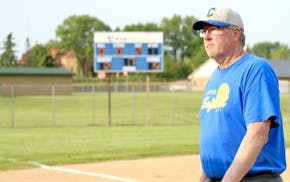CHICAGO — Patrick Sharp was a young center in the Philadelphia Flyers' organization when he got a lesson from Hall of Famer Bobby Clarke on taking faceoffs. Clarke played 15 seasons in the NHL and won two Stanley Cups, so Sharp listened intently.
He carries the heart of the message with him to this day.
"The biggest thing he told me was, 'Get in there, get low and just battle and not be afraid to get dirty,'" said Sharp, now a wing for the Chicago Blackhawks. "Sometimes you get thinking about what the other guy's doing and what you want to do at the faceoff dot and sometimes the best way is just get in there and compete for that puck."
That competition has taken on added significance in this year's Stanley Cup finals, with the evenly matched Blackhawks and Boston Bruins vying for the title. There are stars all over the ice, so every draw can lead to another opportunity for a gifted scorer to pick up a crucial goal.
"Faceoffs are critical, especially at this point in the season," Bruins defenseman Torey Krug said. "The more times you can start with the puck than not obviously boosts your team.
"You want to have first crack at playing with the puck, especially a team like them, they like to play with the puck a lot more rather than dump the puck in. It's important."
Faceoffs played a huge role when Boston beat Chicago 2-0 in Game 3 to take a 2-1 advantage in the series. The Bruins won a whopping 40 of the 56 draws in the victory, including six of seven when they were on the power play or short-handed. The disparity was a factor in limiting the Blackhawks to just 28 shots on goal.
Chicago gradually turned it around in each of the next two games, winning 39 of 77 faceoffs on Wednesday night and 33 of 57 in Game 5. The improved performance on the draws helped the Blackhawks to two victories that moved them within one win of their second Stanley Cup title in four years.
"I thought we were much more effective than in the prior game," Chicago coach Joel Quenneville said before Saturday night's 3-1 win. "They got better as the game went on. I just think starting with the puck is key. I think having it against this team is important.
"When you're at a disadvantage, that big of a variance, you're definitely against it, and I think especially in the big faceoffs, the critical ones, especially starting special teams plays a huge importance."
Chicago and Boston each has one of the best centers in the league when it comes to winning faceoffs. Bruins star Patrice Bergeron had an NHL-best 62.1 percent faceoff winning percentage this season, and Blackhawks captain Jonathan Toews was second at 59.9 percent.
While the natural talent for Bergeron and Toews is a factor in their success, there's so much more that goes into winning faceoffs, especially in the playoffs. It's about practice, scouting and the effort by the other players on the ice. The linesman that drops the puck also is important.
"Everyone's got to be competitive and hungry to get the puck," Toews said. "At the end of the day a lot of bounces can go the wrong way but I think if you're working hard and you're ready for it you're going to get more draws."
The preparation starts with scouting and video work. The players and coaches examine past faceoffs to look for tendencies in opposing players and also where their own technique can improve.
"Every series when you play against the same guys for a few games, there are some tendencies that you learn," said Bergeron, who missed much of Game 5 with an injury. "You try to, I guess, counter and I'm sure they're doing the same things.
"Sometimes, some of the things you've been doing have not been working as well and you try to tweak some things and talk to your centermen as the series progresses."
There's also plenty of gamesmanship when it comes to the linesman dropping the puck. It's up to the official to conduct a fair faceoff while the centers jockey for position and any little advantage they can find.
"They have a tough job, because there is a certain protocol that you're supposed to follow to take a faceoff and both teams, you want to cheat as much as you can and you're not afraid to get thrown out because a lot of guys can take draws," Sharp said. "It's like a three-way responsibility, both teams and the refs as well."
While statistics show how well each team did on the draws and which players did well against other players, not all faceoffs are created equal.
The importance of winning the draw depends on the location and the situation in the game. Faceoffs on special teams are crucial, because a successful one allows a team to set up its power play or can help it kill off a man-advantage situation for its opponent.
In the NHL, it's more about which faceoffs you win than how many.
"At the end of the day you try to win it whenever the ref tries to throw the puck down," Sharp said. "You want that puck."

Series: What's happening at the U as NIL rules rock college sports?

